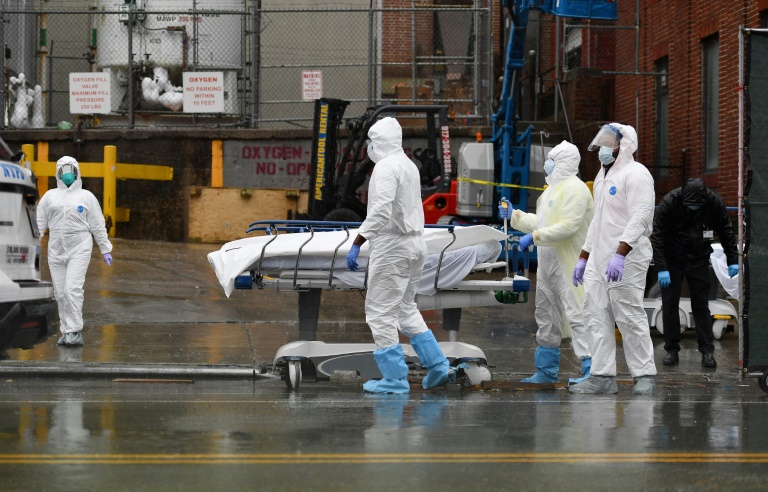
Medical personnel move a deceased patient to a refrigerated truck serving as a makeshift morgues at Brooklyn Hospital Center on April 9, 2020. (Photo: AFP)
The United States may be ready to start gradually reopening next month, the government's top infectious diseases expert said Sunday, as signs grew that the coronavirus pandemic is peaking.
President Donald Trump had earlier wanted the world's largest economy to be "raring to go" by Sunday, but most of the country remained at a standstill and churches took Easter celebrations online to halt the spread of the virus that has killed more than 20,000 people in the US.
Trump has cast the decision on when to ease the lockdown as the biggest of his presidency as he faces competing pressures from public health experts and businesses along with some conservative allies who want a swift return to business as usual.
Anthony Fauci, the veteran pandemic expert who has quietly sought action to stem infections, said in a televised interview that parts of the country could begin easing restrictions next month -- but was cautious.
"I think it could probably start at least in some ways maybe next month," Fauci, head of the National Institute of Allergy and Infectious Diseases, told CNN.
"We are hoping by the end of the month we can look around and say, okay, is there any element here that we can safely and cautiously start pulling back on?" Fauci said.
"If so, do it. If not, then just continue to hunker down,."
Fauci said that regions would be ready at different times rather than the United States turning on a "light switch."
Stephen Hahn, commissioner of the Food and Drug Administration, said it was premature to say that the country would reopen on May 1.
"We're hopeful about that target, but I think it's too early to be able to tell that," Hahn said in an ABC interview.
Unlike in most Western countries, lockdown decisions are primarily up to local governments, not the president, and leaders of a number of hard-hit, densely populated states have made clear that they will take action as long as necessary.
"I fear if we open up too early and we have not sufficiently made that health recovery and cracked the back of this virus, that we could be pouring gasoline on the fire, even inadvertently," New Jersey Governor Phil Murphy, a Democrat, told CNN.
Maryland Governor Larry Hogan, a Republican, cautioned against an "artificial deadline" and called for more extensive testing.
Trump said in early March that any American who wants to be tested for coronavirus will be able to do so but has walked back his promise amid a shortage, saying that rural states were not a priority.
- 'Cautiously optimistic' -
The United States has been recording nearly 2,000 deaths a day from the coronavirus, disproportionately older people with weakened immune systems and ethnic minorities with less access to health care and teleworking.
Fauci said he was "cautiously optimistic" as admissions into hospitals and intensive care had begun to decline even in worst-hit New York.
There are sign the outbreak "not only has flattened, it's starting to turn the corner," he said.
The United States, which has 4.25 percent of the world's population, accounts for almost a fifth of the world's nearly 110,000 deaths from COVID-19 since the disease first emerged in China late last year.
The New York Times, in an extensive article published Sunday, described Trump as failing to act quickly in part due to his confidence in his gut instincts and his distrust of civil servants he brands as a conspiratorial "deep state."
Fauci, who has advised six successive presidents, acknowledged in the CNN interview that the United States could have saved lives by shutting down public spaces when the disease's seriousness became clear early in the year.
"But there was a lot of pushback about shutting things down back then," said Fauci, without naming Trump.
Trump had been hoping to campaign on a strong economy as he seeks re-election in November.
Instead, some 17 million people have lost their jobs in a matter of weeks and his presumptive Democratic rival, Joe Biden, has been hammering him for not doing more to stop the virus.


